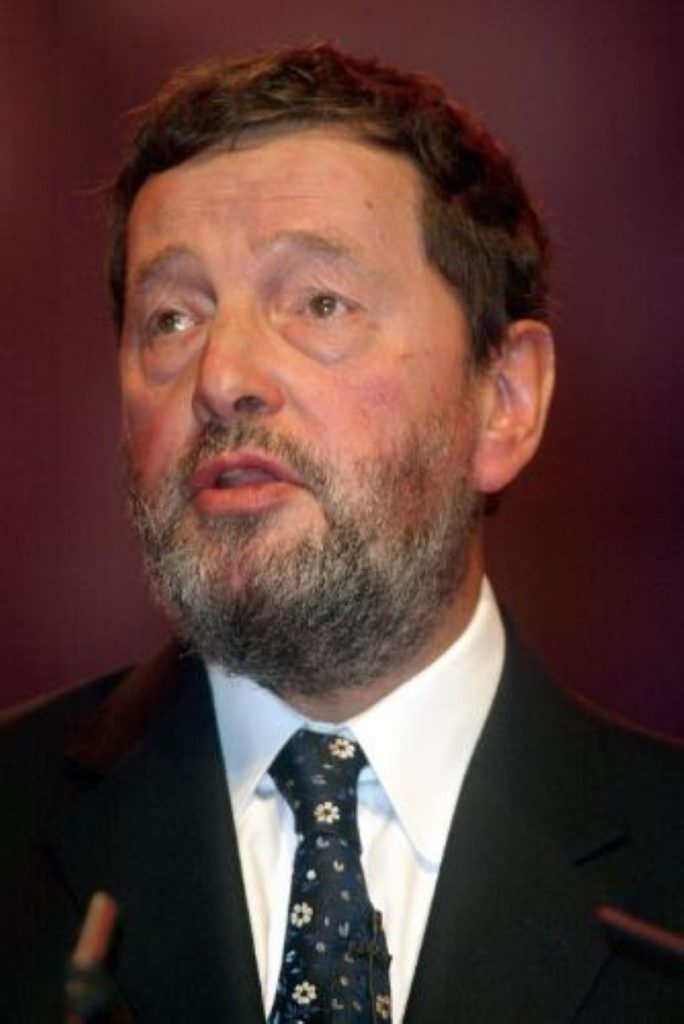Terror threat on Britain’s ‘doorstep’ warns Blunkett
The Home Secretary David Blunkett has warned that Al Qaeda and other international terrorist networks are on Britain’s “doorstep and threatening our lives”.
His comments followed those of the Metropolitan Police Commissioner Sir John Stevens who today confirmed that a “number” of attempted terror attacks in the UK had been successfully thwarted.
Sir John said there is presently a “large number of people” going through the courts.
The outcome of these cases, Mr Blunkett stated, will expose the extent of the threat posed to Britain from international terror.


“Al Qaeda and the international network that is seen to be – and will be demonstrated through the courts over months to come – to be actually on our doorstep and threatening our lives,” he told BBC One’s ‘The Politics Show’.
He added: “They may be found not guilty – but our security and policing services have been securing our wellbeing over the last few years.”
The Home Secretary insisted however that Labour will not attempt to bolster support in its election campaign by tapping into the climate of fear.
The Government, he stated, will instead continue its attempt of reassuring the populace through “hope”, rather than “hype”.
Mr Blunkett did, however, stress that this must be achieved by introducing tough policies aimed at tackling security concerns both internationally and domestically.
In doing so, the policy remit must extend from increased local policing to a system of identity cards – measures he said necessary to give the public a sense of hope.
The Home Secretary rejected suggestions that the Government was therefore attempting to win votes by bundling-up domestic crime with issues of international terror.
The link between security both at an international level and a local one was “inextricable”, Mr Blunkett explained.
“We are attempting to ensure that we deliver the politics of hope about a modern Britain for the 21st century, people content comfortable in their own lives, secure in their neighborhoods.”
“You can only overcome that insecurity by taking measures this side of a general election, not hyping up and promising measures afterwards.”
He defended his proposed ID cards and tighter border controls as crucial not only for security but as a means of reassuring people the Government was doing all it could to prevent terrorists attacking Britain.
Mr Blunkett was equally keen to stress that such policies were not born overnight in a bid to instill fear into the electorate.
Measures such as identity cards had been in the political pipeline for well over three years, he said.
“We need ID cards because we need to know who is in our country, we need to know whether they are entitled to draw down on our free services, we need it to ensure that people are entitled to work rather than in the black economy.”
“We need it because 35 per cent of those engaged in terrorism across the world..actually use multiple identities.”
He added: “If we can get to them and we can trace them we can do something about protecting ourselves.”
But human rights lawyer, Anthony Scrivener QC, accused the Home Secretary of attempting to “prey on the fears” of the public to secure votes.
Mr Scrivener said: “I have no doubt he’s trying to apply the Bush principle.
“It’s exactly what President Bush did. He scared people stiff. He first off all brought in a whole raft of measure taking away liberties – he said it was necessary because of the terrorist activity.
“Secondly he could say we are active, we are doing something.
“On the basis of those two things”, Mr Scrivener argued, “all sorts of repressive legislation can be pushed through preying on the fears of the ordinary members of the public.”
Mr Blunkett, however, stressed that he was not attempting to “frighten people” in the build up to the General Election expected next May.
But he said tough security measures were needed to protect the people from potential terror attacks.
“People don’t want to have us with very good systems of picking their bodies up”, he said. “They want us to actually have very good systems of protecting their lives.”
The Home Secretary concluded by assuring he was not intent on hyping up the atmosphere of insecurity, rather though, overcoming it.












